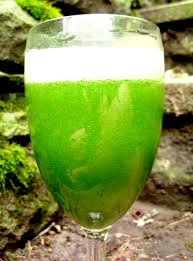“I’ve keep hearing about green juice lately. What are the benefits of green juice and does it live up to all the hype?” ~ Richard
Great question! I am a huge advocate of fresh green juice! Greens are one of nature’s most potent superfoods; they’re loaded with essential nutrients, antioxidants, phytochemicals and even protein and omega 3. Did you know that the juice of 1 bunch of raw spinach contains about 10g of protein (about 20-25% of the recommended daily intake for the average adult female)? This makes fresh green juices and smoothies an excellent recovery shake post-workout. Fresh green juice also has an alkaline, cleansing and detoxifying effect, particularly for the liver.
I love green juice because it is such a concentrated and easily digested and absorbed food. Since all of the insoluble fiber is removed in the juicing process, it generally does not cause the GI irritation and bloating that eating large amounts of fresh greens can sometimes cause, especially for those with sensitive GI systems or poor digestion. It also allows many people who are unable to eat greens (let alone raw greens) due to bowel disease, endometriosis, adhesions or surgery to include greens in their diet in a way that their digestive system can tolerate. Many people find that their general health, energy levels, skin and overall well-being improve when they are drinking fresh green juice on a regular basis.
Bottled juices are not the same as they have been processed, pasteurized and have been sitting on a shelf indefinitely. They only contain a fraction of the nutrition of a freshly pressed raw juice and usually significantly more sugar. The best way to drink green juice is straight out of the juicer. I also recommend sticking with juices that are predominantly low sugar vegetables (greens, celery, cucumber, fennel) and only a little bit of fruit such as lemon, apple, pear or pineapple or sweet vegetables like carrots and beets. If you are new to green juicing, try my delicious Get the Glow Green Juice, a great beginner green juice that is also husband and kid-friendly.
That being said, green juice is a healthy food, not a miracle cure. It is also important to check with your doctor first before starting any juicing program, particularly if you are taking any medication or have any health condition.
What is your favorite green juice blend? Do you have a nutrition question? Please ask in the comments below and on Facebook and your question may be featured in an upcoming Ask the Nutritionista post.
Love what you are reading? Stay in the loop and never miss a recipe; subscribe to our FREE Nutritionista ezine for free expert tips, success strategies and delicious healthy recipes and receive Erin’s exclusive list of the Top Ten Foods to Banish From Your Kitchen ($24.99 value) absolutely free! Get ready to nourish yourself sexy!
We promise never to sell, rent, trade or share your email with any other organization and we will not spam you.
© 2013 Nutritionista. Erin Luyendyk, RHN. All rights reserved.
All material found on www.thenutritionista.ca is intended as general educational material only and should not be considered medical or nutritional advice. It is not intended to diagnose, treat, or cure any medical condition and has not been evaluated by the FDA. Please consult with your personal physician before implementing any health, nutrition, supplement or exercise program to ensure its safety and suitability for your specific individual situation



I’ve been having a green juice for breakfast or lunch every day. I usually put two big handfuls of organic kale mix, a handful of spinach, and a little Swiss chard, and a carrot, but in order to “like” it, I have to add more sweetness than the carrot- a mango or a pear and sometimes I add a few raspberries, too. Do you think this too much sugar? Should I maybe use half a fruit instead?
Great question Alex! It depends on the person. Some people can handle a little more sugar than others and certain populations, such as those who are diabetic or have metabolic syndrome need to be much more careful about every gram of sugar, including natural sugars in fresh produce. Pears and raspberries are lower sugar fruit choices than mango or other tropical fruits, so adding a little more pear or berries will help to sweeten up your juice and be a lower sugar choice than mango. Green Granny Smith apples are also an excellent lower sugar fruit to add to green juice. Carrots and beets are also surprisingly high in sugar and even adding a little piece can help to sweeten up a vegetable juice and make it more palatable. I hope this helps, and good luck with your juicing!